Best sunscreen for your face - the tried and tested formulas you'll love
Picking the best sunscreen for your face will keep your skin protected daily. Here, our beauty team and a panel of dermatologists share their favourites.
Rhiannon Derbyshire
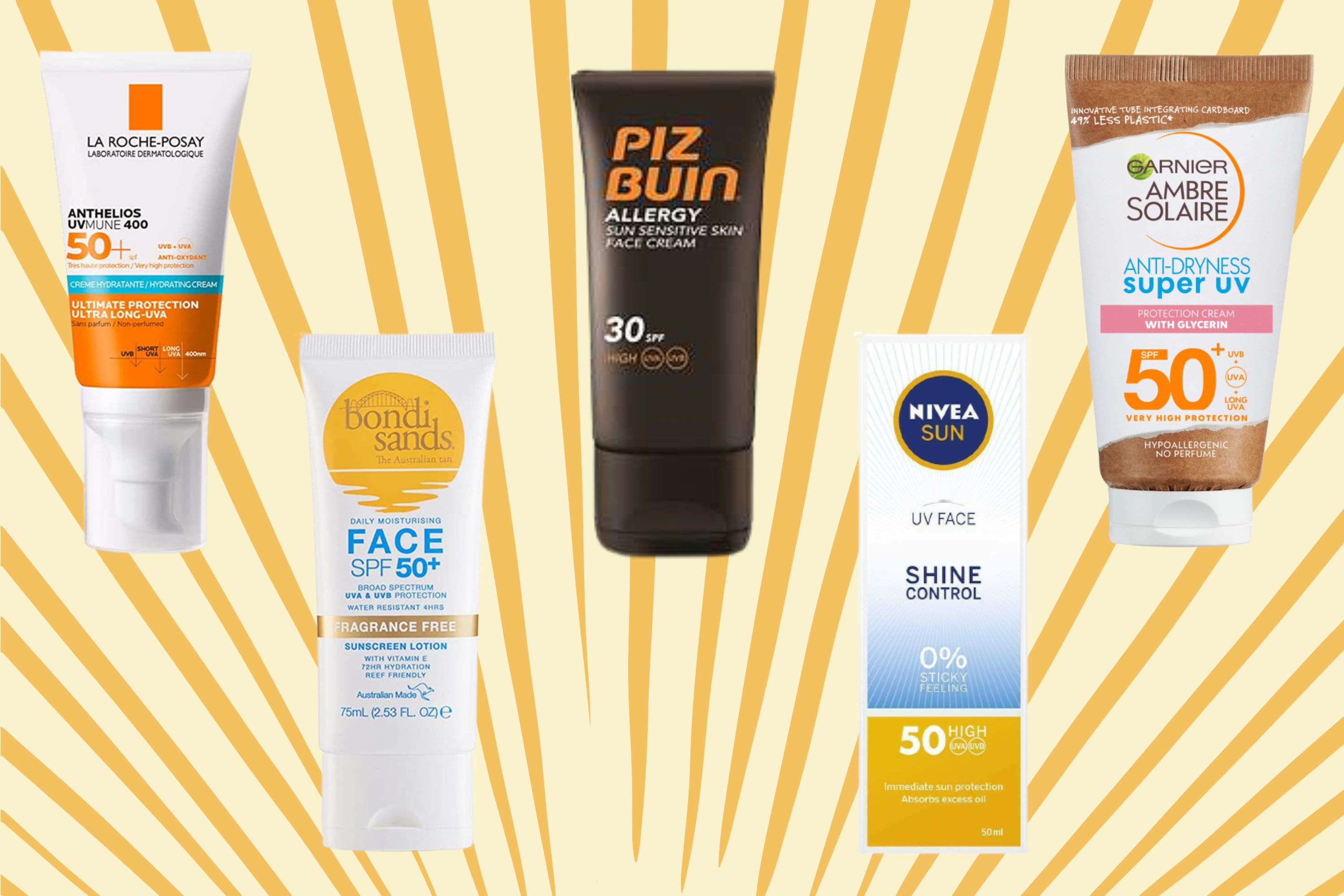
Parenting advice, hot topics, best buys and family finance tips delivered straight to your inbox.
You are now subscribed
Your newsletter sign-up was successful
Using the best sunscreen for your face every day, rain or shine is an essential aspect of skincare.
All experts agree that using the best sun creams is a non-negotiable way of keeping your skin safe. According to Harley Street consultant dermatologist Dr Ophelia Veraitch, “Our faces are exposed to UV light and visible light on a daily basis. UVA causes skin ageing and hyperpigmentation. UVB causes damage that increases the risk of developing skin cancer. The skin is exposed to these factors on a daily basis, no matter what the season or whether you’re inside or outside - rays can penetrate through clouds and windows.”
Not only is it important to use sunscreen to prevent skin cancer symptoms, studies show that sun damage accounts for 80% of signs of ageing. Thankfully, sun creams have come a long way - the best sunscreen for your face is now as light and comfortable as your best moisturisers, while doing some essential shielding. We narrowed down our favourite picks and spoke to several dermatologists to get their expert take on each buy.
What to consider when looking for the best sunscreen for your face
- Star rating: Our in-house star-rating system is based on peer reviews. They’ve tried and tested the sunscreens and awarded stars based on factors such as product quality, ease of use, customer feedback, awards and value for money. Products that have received a 5 star status are rare and considered exceptional, going above and beyond our reviewer’s expectations.
- The type of sunscreen and the level of protection it offered: With sunscreen being such an important product, we wanted to make sure that every buy on this list offered high levels of protection. We considered both chemical and physical formulas (with an explainer on both below), and opted for a minimum of factor 30 protection. Dr. Veraitch doesn't advise going below 30, she explains "I recommend an SPF50 daily, as it provides the most effective protection. However, for those prone to skin congestion and acne I am more flexible in my advice and advise that lower SPF can be advisable, down to SPF30."
- The wearability of the formula: There's no use buying the best sunscreen for your face if you're not going to actually use it. For the formula to really work it has to be one that you really want to wear - we only picked options that felt really comfortable to wear, that didn't feel greasy or sticky, and sat nicely under makeup.
- Cruelty-free: More and more beauty brands have realised that testing on animals is not a humane or sustainable practice. We’re keen to select products from brands that follow this ethos.
The best sunscreens for your face, picked by our beauty team and dermatologists
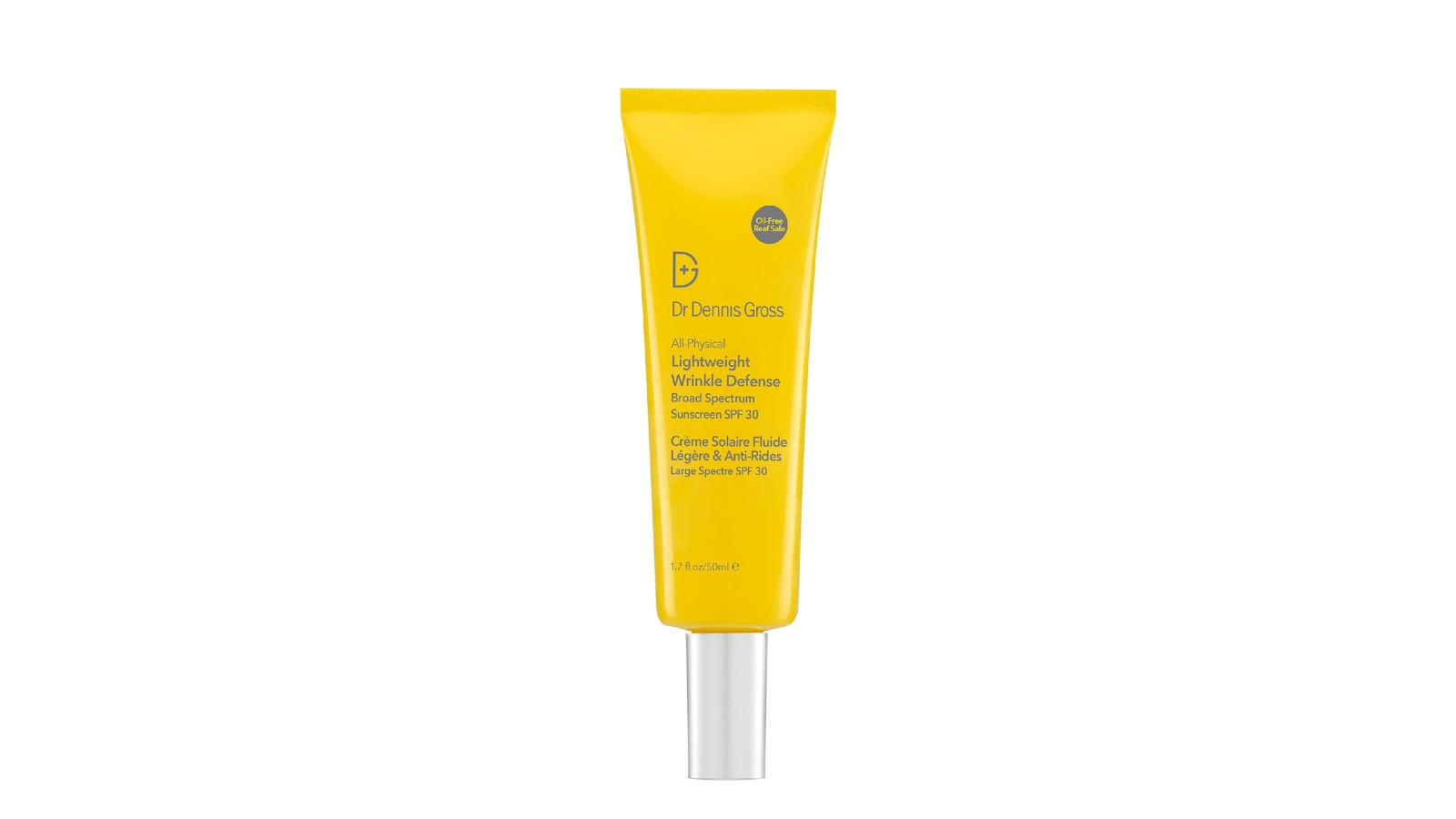
1. Dr. Dennis Gross All Physical Lightweight Wrinkle Defense SPF30
Our expert review:
Specifications
Reasons to buy
Reasons to avoid
As we've already touched upon, mineral sunscreens have previously had a bad reputation for being thick, difficult to rub in and leaving a white cast. Luckily Dr Dennis is debunking all those myths for us, having created a mineral sunscreen that’s easily absorbed and suitable for all skin tones.
We were concerned that a high factor, mineral sunscreen would result in breakouts, but there were no spots to be found, even on typically oily areas across the T-zone. The texture is light and comfortable, and as an added benefit, it's packed with antioxidants like bearberry, sea buckthorn, lingonberry, and ferulic acid. And these work behind the scenes to banish the pesky free radicals which can speed up the ageing process.
Dermatologist verdict: "It's a physical sunscreen suitable for all skin types but especially dry skin," Dr Anton Alexandroff, a Doctify-reviewed dermatologist explains. "It's also non-comedogenic which means it's safe for acne-prone skin too. Plus it is made by an experienced dermatologist and is very hydrating."
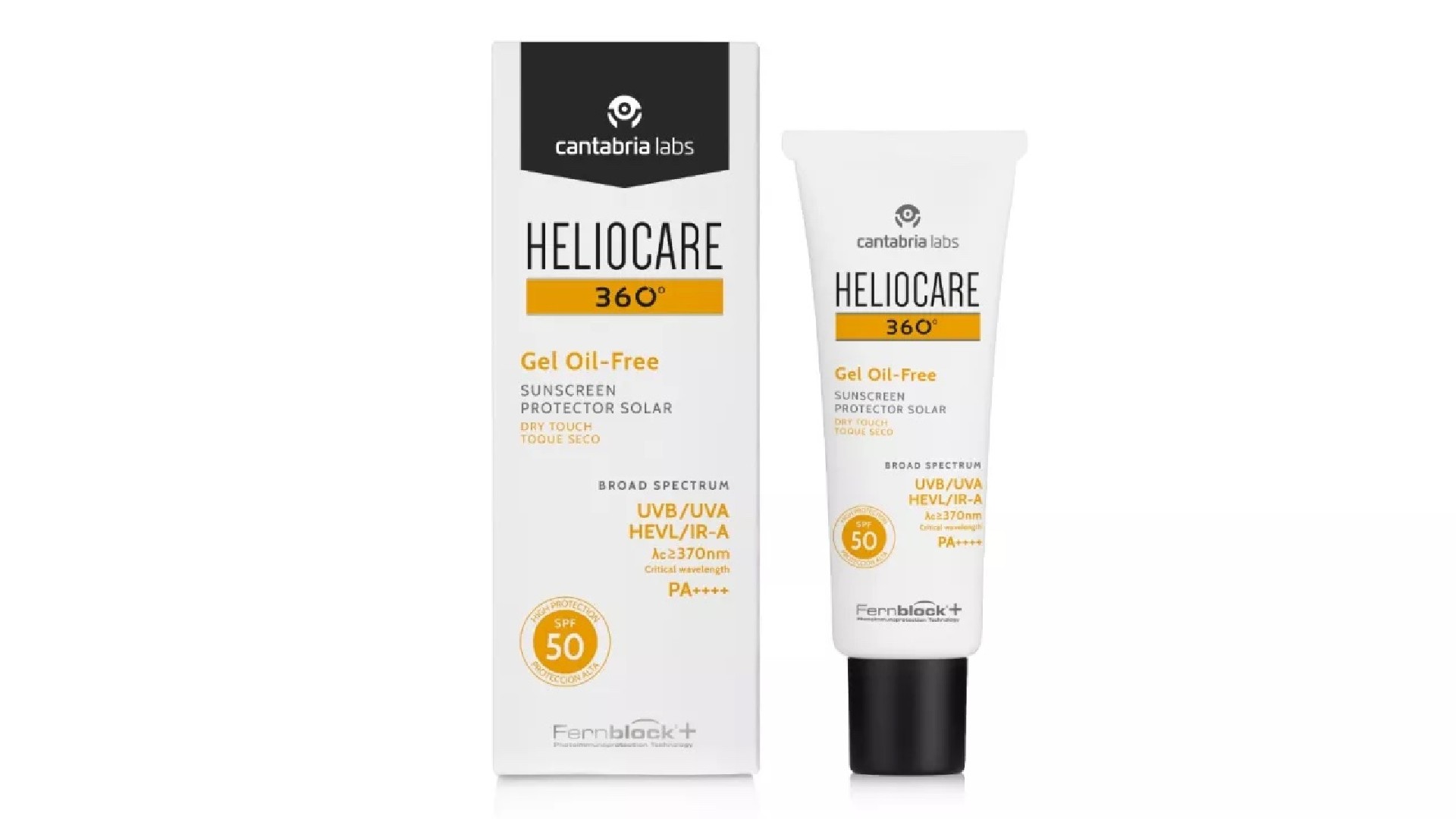
2. Heliocare 360° Oil Free Gel SPF50
Our expert review:
Specifications
Reasons to buy
Reasons to avoid
SPF and oily skin don’t tend to play nicely together. And if you’re anything like me, you’re more likely to bring home a face full of tiny white heads from your holiday than a glowing tan. Enter Heliocare. The oil-free formula glides onto skin before becoming quickly dry to the touch. Once on, we found it sits nicely under make-up, and doesn’t contribute to the dreaded 3pm shine. It didn't block our pores either, leaving skin clear and fresh. The colour is ever-so-slightly tinted, which makes it a great all-rounder for all skin tones.
Dermatologist verdict: "I’m a huge fan of Heliocare 360 as the range genuinely offers something for everyone and their preference e.g. spray, cream, gel etc," says consultant dermatologist Dr Emma Wedgeworth. "It features Fernblock, a unique ingredient which harnesses natural plant power to defend skin cells from damage caused by the sun and protecting our skin cell DNA, alongside a Bioshield system that protects skin against visible light - like our own melanin, but much more powerful."
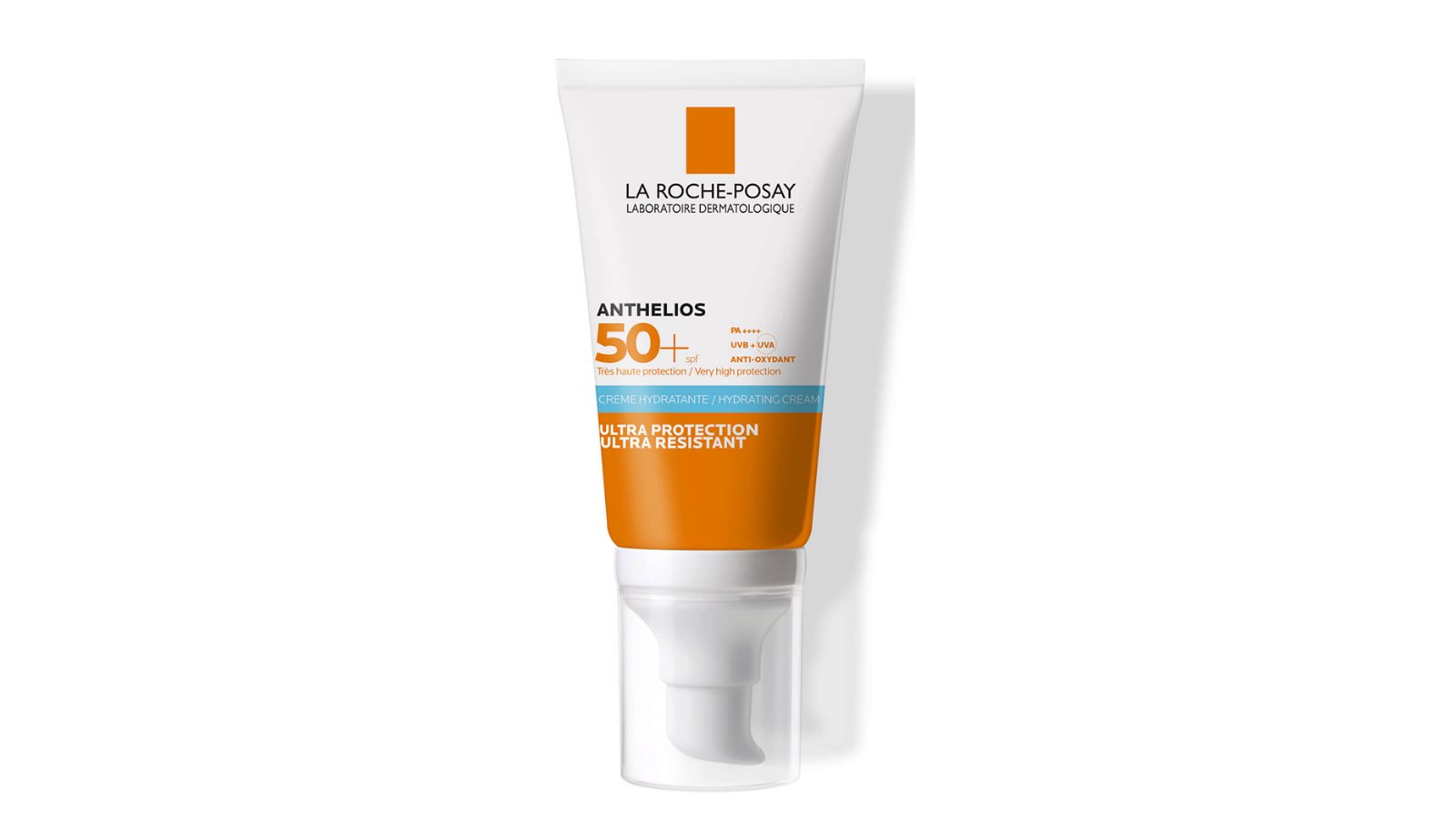
3. LA ROCHE-POSAY ANTHELIOS UVMUNE 400 HYDRATING SUNCREAM
Our expert review:
Specifications
Reasons to buy
Reasons to avoid
For high-quality facial sun cream, La Roche Posay's SPF 50+ Anthelios Ultra Comfort Cream is one of the best out there. Although it comes with a higher price tag, it's worth investing in if you really struggle with dry skin due to it's added hydrating powers. The ingredients create a lightweight cream which provides a spectrum of defence against harmful UVA, UVB and infrared radiation, while also moisturising the skin and helping to create a healthy complexion.
Dermatologist verdict: This is a great sunscreen that provides protection against infrared, UVA, UVB radiation which helps protect against skin cancers as well as photoaging," Dr Suchitra Chinthapalli tells us, consultant dermatologist at The Harley Street Dermatology Clinic. "It's hydrating and applies easily. It's particularly useful if you have dry skin."
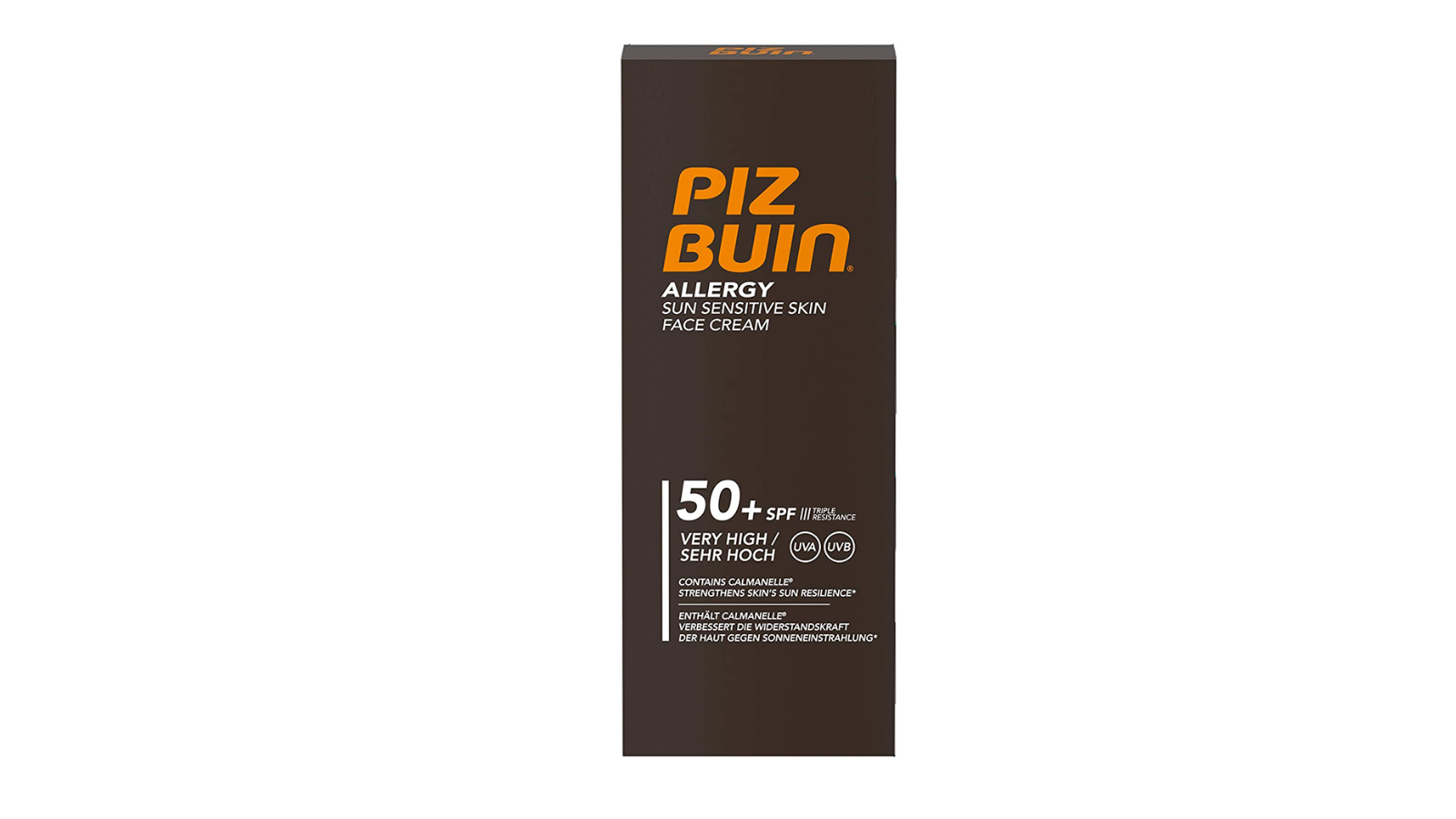
4. PIZ BUIN Allergy Sun Sensitive Face Cream SPF30 50ml
Our expert review:
Specifications
Reasons to buy
Reasons to avoid
We love Piz Buin's facial sun cream as it was designed alongside dermatologists, with sensitive skin in mind. This means that it's really effective in preventing prickly sensations and blotchiness caused by UV rays on the skin. It offers sun protection along with the brand's unique anti-irritant shield, helping our skin to become more resistant to the sun in the long term. Plus it's both water and sweat resistant, making it a good contender for hotter days. We loved using this on a particularly sweltering summer day, skin felt comfortable and soothed.
Dermatologist verdict: "This is designed for sunsensitive skin, and also sensitive and itchy skin making it a good pick overall," says dermatologist Dr Anton Alexandroff. "Water and sweat resistant, it contains powerful antioxidants to protect against UVB and UVA damage."
5. Ultrasun UV Face & Scalp Mist SPF50
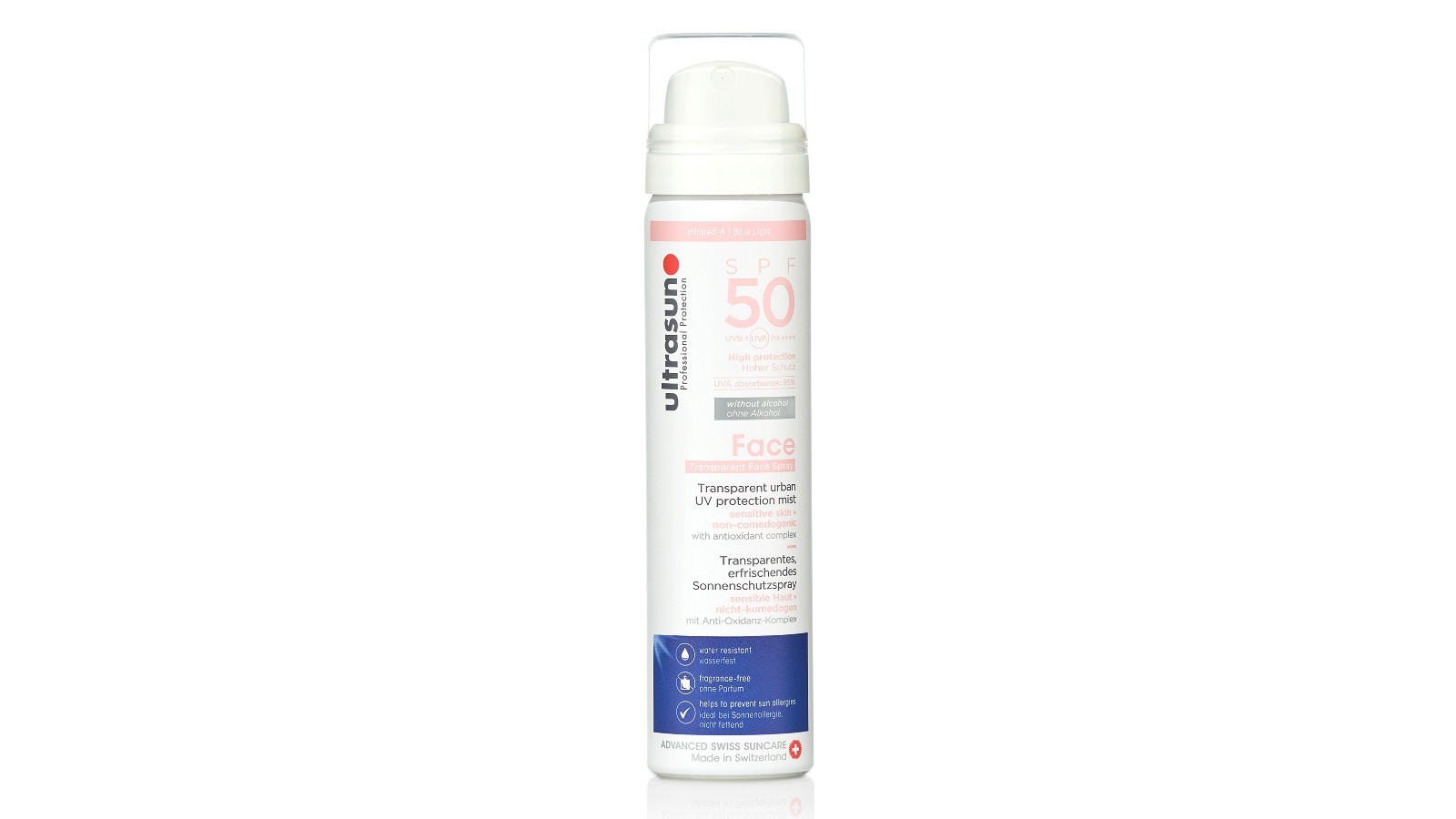
5. Ultrasun UV Face & Scalp Mist SPF50
Our expert review:
Specifications
Reasons to buy
Reasons to avoid
Be honest, do you really take your sun cream all the way to your hairline, or does the prospect of greasy hair cause you to stop halfway up your forehead? If that sounds like you, you’re not alone. In fact, according to Ultrasun MD Abi Cleeve, this is one of the sites where skin cancer is becoming most prevalent. To help you ensure you’re getting the best possible protection, without compromising on your roots, this lightweight spray has been designed as an extra step. Abi adds that it's a mix of between mineral and chemical sunscreen to reap the most rewards: "At Ultrasun we look for an optimal balance between the two, so we look at smaller particles of titanium and zinc that will physically stop the sun’s rays, combined with chemical absorbers in a quantity and a level that the skin can cope with."
We've been keeping one in our bag, and one on our desks, for fuss-free top-ups whenever and wherever necessary. It’s completely transparent, so won’t leave you with tell-tale white dots on your skin.
Dermatologist verdict: "This contains InfraGuard which combines organic sunflower shoots and powerful antioxidants from the tara tree," Dr Anton tells us. "This means it protects from both infrared and visible blue light. It's a quick drying transparent spray which can be worn over or under cosmetics."
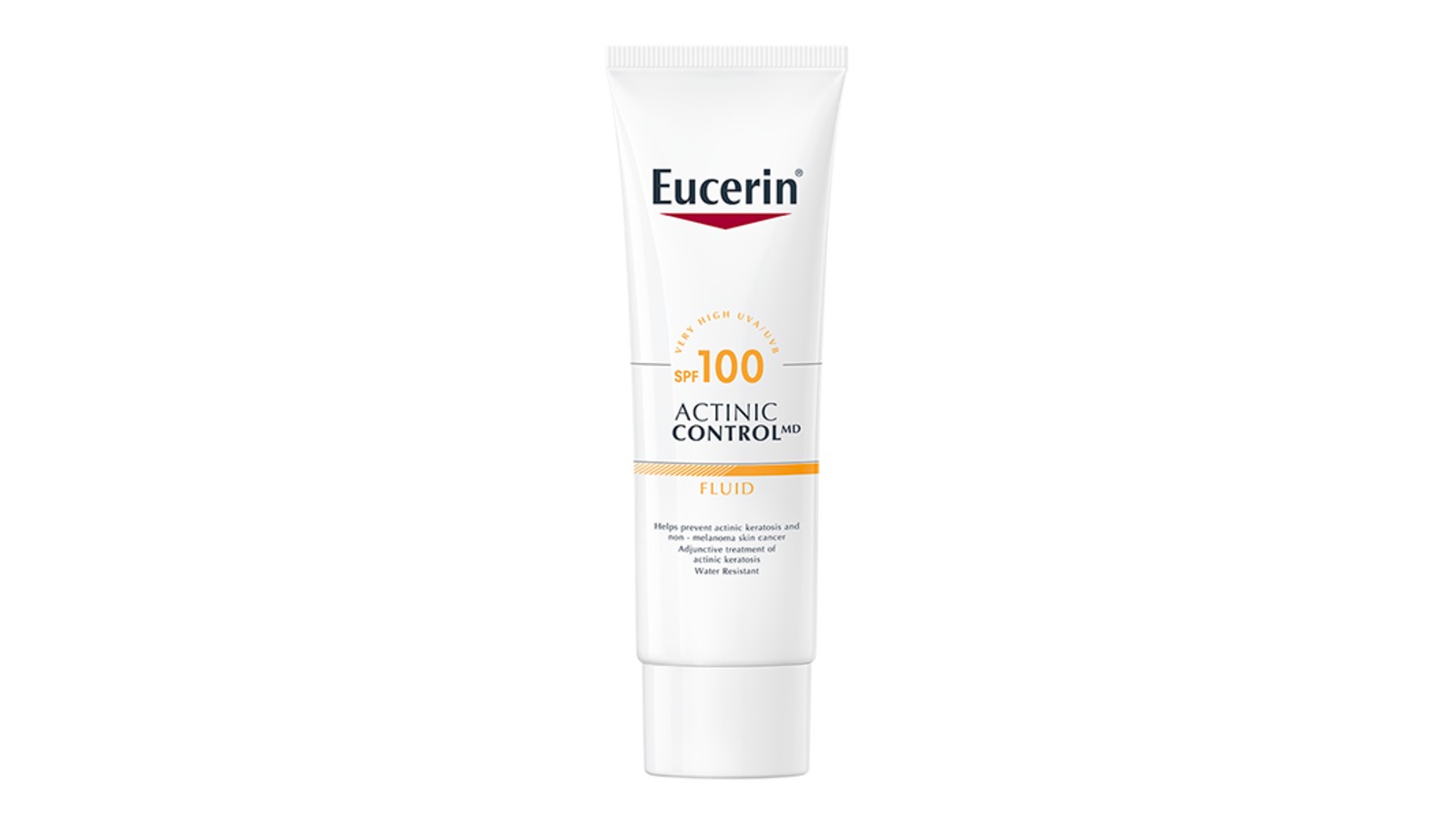
6. Eucerin Actinic Control Fluid SPF100
Our expert review:
Specifications
Reasons to buy
Reasons to avoid
Released in 2021, this is Eucerin’s first medical SPF, and boy does it pack a punch. Instead of simply protecting skin against UVA and UVB damage, it has been specifically formulated to prevent non-melanoma skin cancers including actinic keratosis too. Actinic Keratosis appears on the skin as dry, scaly spots and is often clay-like in colour. It can become malignant if left untreated. Remember to check your skin regularly for any changes, and visit your GP if you’re concerned. As for the formula, we found it to be impressively lightweight for an SPF 100. The yellowish colour absorbs quickly with no white cast.
Dermatologist Verdict: "The highly effective combination of high UVA/UVB protection and broad-spectrum filters offers our consumers maximum sun protection," explains Dr. Gitta Neufang, Chief Innovation and Medical Officer at Beiersdorf. "As intensive protection is important in particular for skin, which is already damaged, we also tested its skin tolerance on patients with skin which is sensitive to the sun and with actinic keratosis."
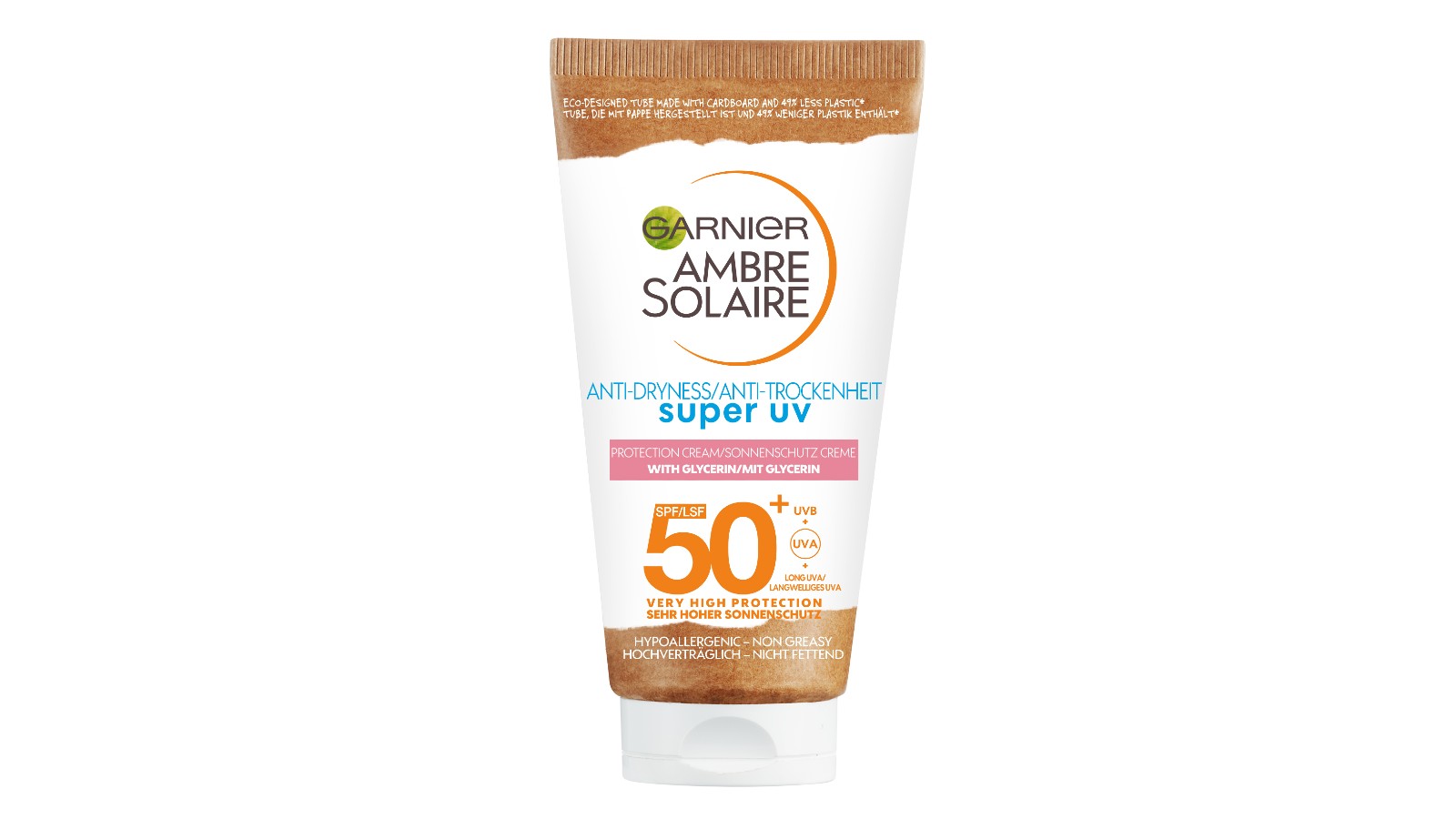
7. Garnier Ambre Solaire Anti-Dryness Super UV SPF50+
Our expert review:
Specifications
Reasons to buy
Reasons to avoid
If you’re on a budget, Garnier Ambre Solaire Anti-Dryness Super UV is a real bargain. It’s suitable for all skin types but really earns its keep when used on skin that’s sensitive, dry, or easily irked. There’s no added fragrance and it won’t sting if some does end up near your eyes. As for the texture, we found it was slippery, but not greasy, so you don’t need a huge amount to get a decent layer of coverage. The addition of glycerin helps skin to hold onto moisture, even in warm, drying conditions.
Dermatologist verdict: "It's an affordable synthetic sun cream that's great for dry skin as it hydrates skin and makes skin smooth," dermatologist Dr Anton Alexandroff summarises.
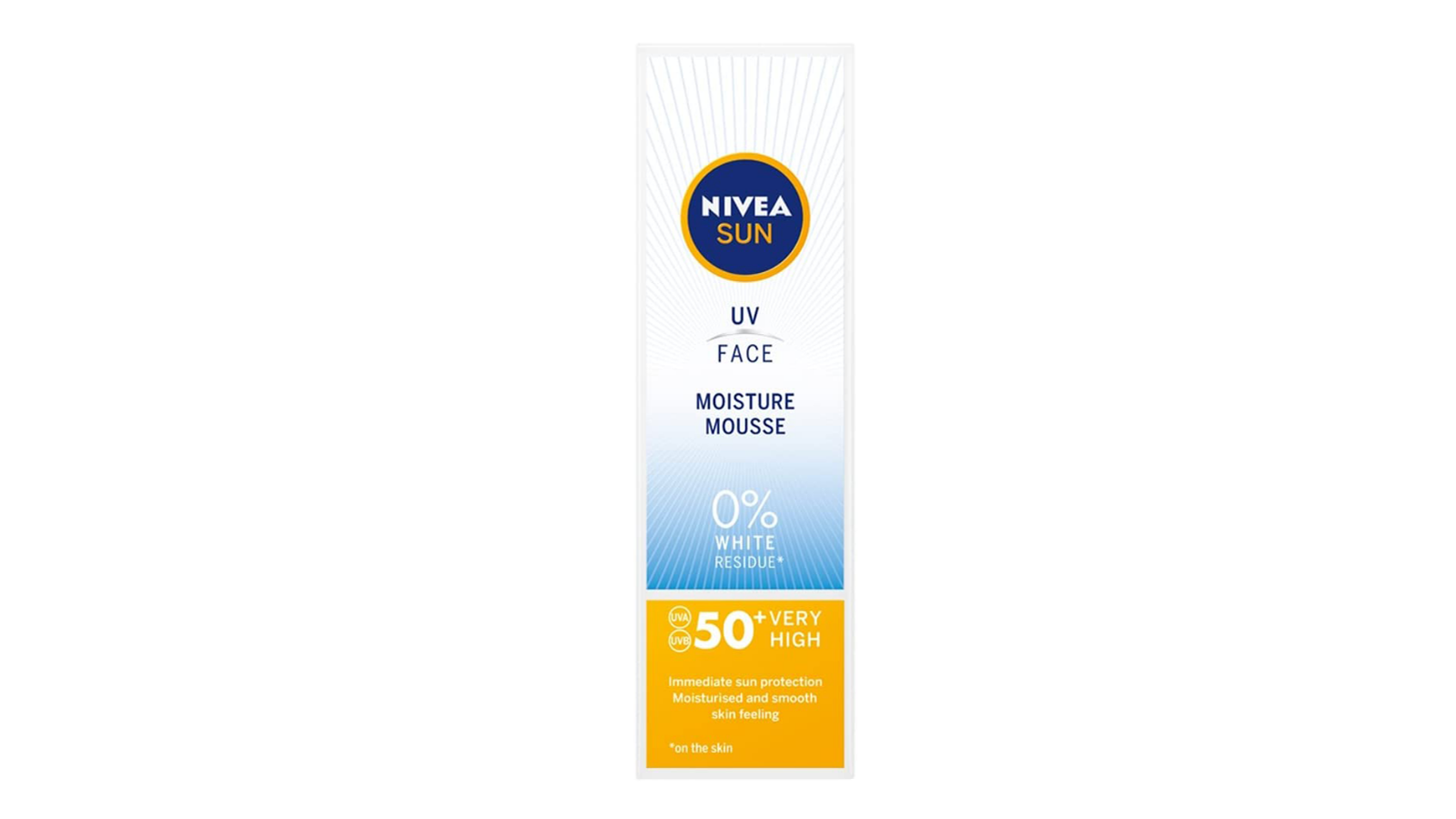
8. NIVEA SUN UV Face Suncream SPF 50 Shine Control 50ml
Our expert review:
Specifications
Reasons to buy
Reasons to avoid
Nivea's specialist face sun cream is another great option. It's specially formulated to create a long-lasting, mattifying effect, meaning that you can wear it under makeup and avoid the classic greasy shine that many sun creams create. It's lightweight and immediately absorbs excess oils from the surface of your skin, meaning that it's one of the best sunscreens for your face if prone to acne. Our blemish-prone tester loved the texture of this, and the grease-free finish.
Dermatologist verdict: "I tend to use ‘Nivea for Kids’ but will be giving this a try," says Dr Adam Friedmann, a consultant dermatologist at Stratum Clinics. "My criteria for use is that it is a high SPF, so 30 or above, it has a high UVA star rating, it goes on easy with no ghosting/whiteness, it lasts well in water and doesn’t sting the eyes too much. This ticks all those boxes"
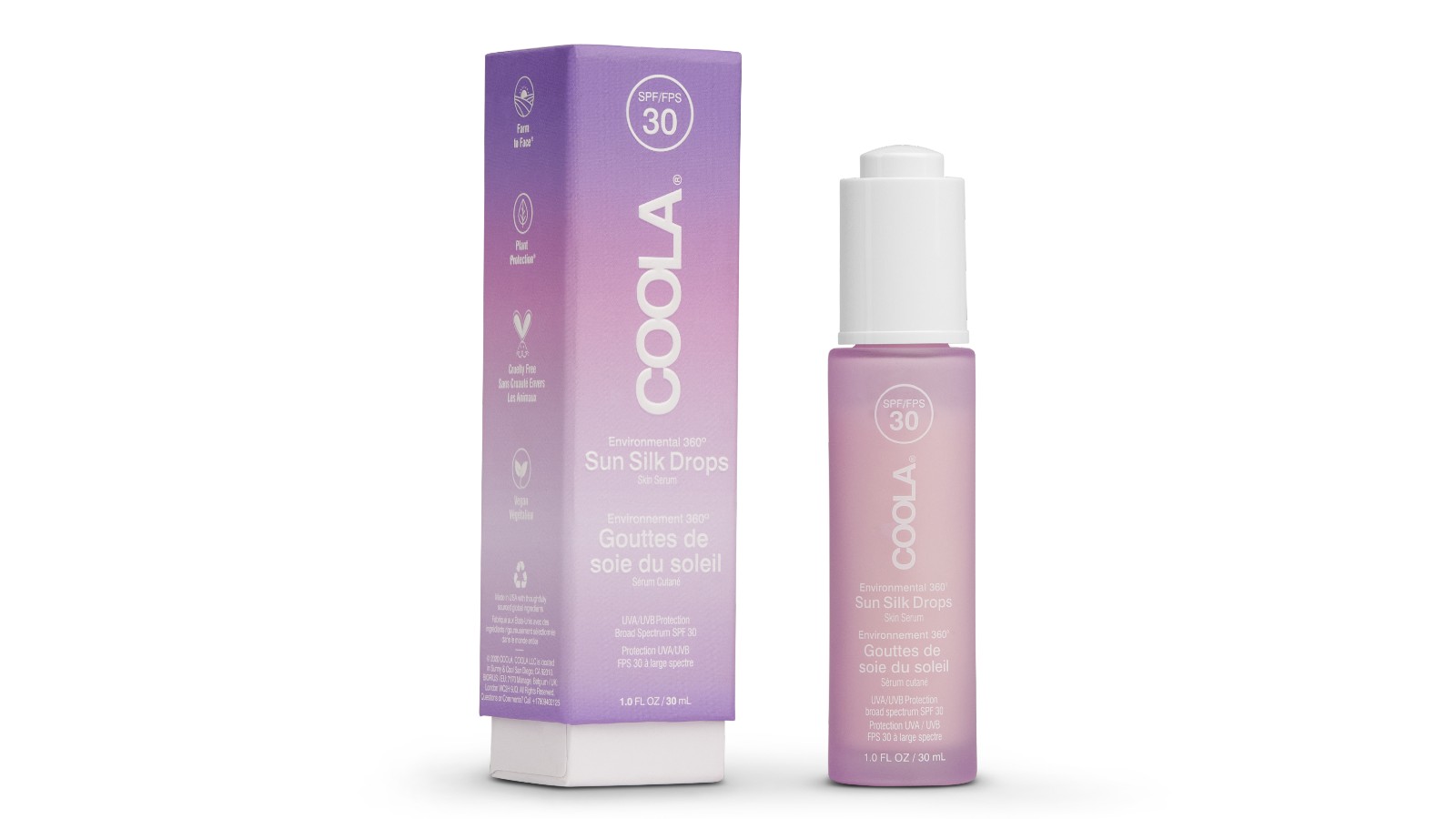
9. Coola Full Spectrum 360 Sun Silk Drops SPF30
Our expert review:
Specifications
Reasons to buy
Reasons to avoid
We love a product that does just as it says on the bottle, and this SPF really does deliver a silk-like consistency. It’s lovely and light and feels cool on the skin, which is a welcome treat on warm days. The finish is quite luminous, which might not suit all tastes, but definitely gave our lackluster skin a pick-me-up. Use the built-in pipette to easily dispense a few drops onto the back of your hand before liberally massaging in. It pays to use extra on your hands too, as these can be one of the first places to show signs of ageing.
Dermatologist verdict: Dr Anton Alexandroff likes the fact that this "contains plant stem cells and antioxidants" which boost skin health and growth. He adds: "This has BlueScreen Digital De-Stress technology to protect against high energy visible blue light plus infrared light as well as UVB and UVA." Aka the more pollutant protection the better.
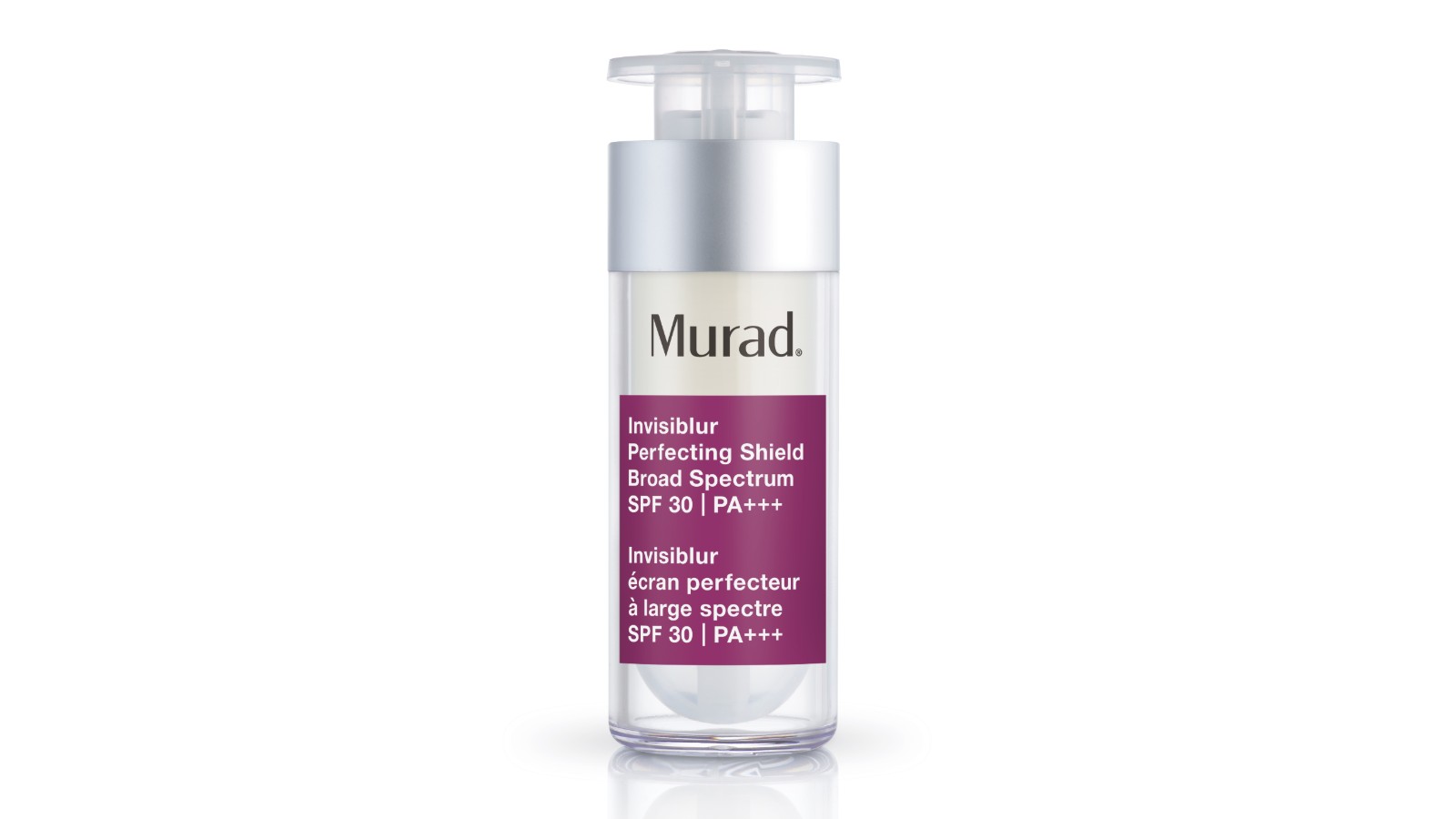
10. Murad Invisiblur Perfecting Shield SPF30
Our expert review:
Specifications
Reasons to buy
Reasons to avoid
We have tried a lot of sunscreens over the years, but none deliver quite like Murad. The Invisiblur Perfecting Shield is a real favourite of the Goodto team, mainly as it doesn’t feel at all like sunscreen. It has a luxurious, velvety texture and creates such a smooth canvas that it doubles as a primer as well. We like wearing it on no-make-up days too to take the edge off of large pores and other imperfections. If that’s not enough to sway you, the skincare benefits might. Mushroom peptides and cucumber extracts work behind the scenes to restore firmness and moisture.
Dermatologist verdict: Though "expensive" Dr Anton recommends this for "all skin but especially combination because it primes skin and minimises pores and fine lines. It's ideal before make up."
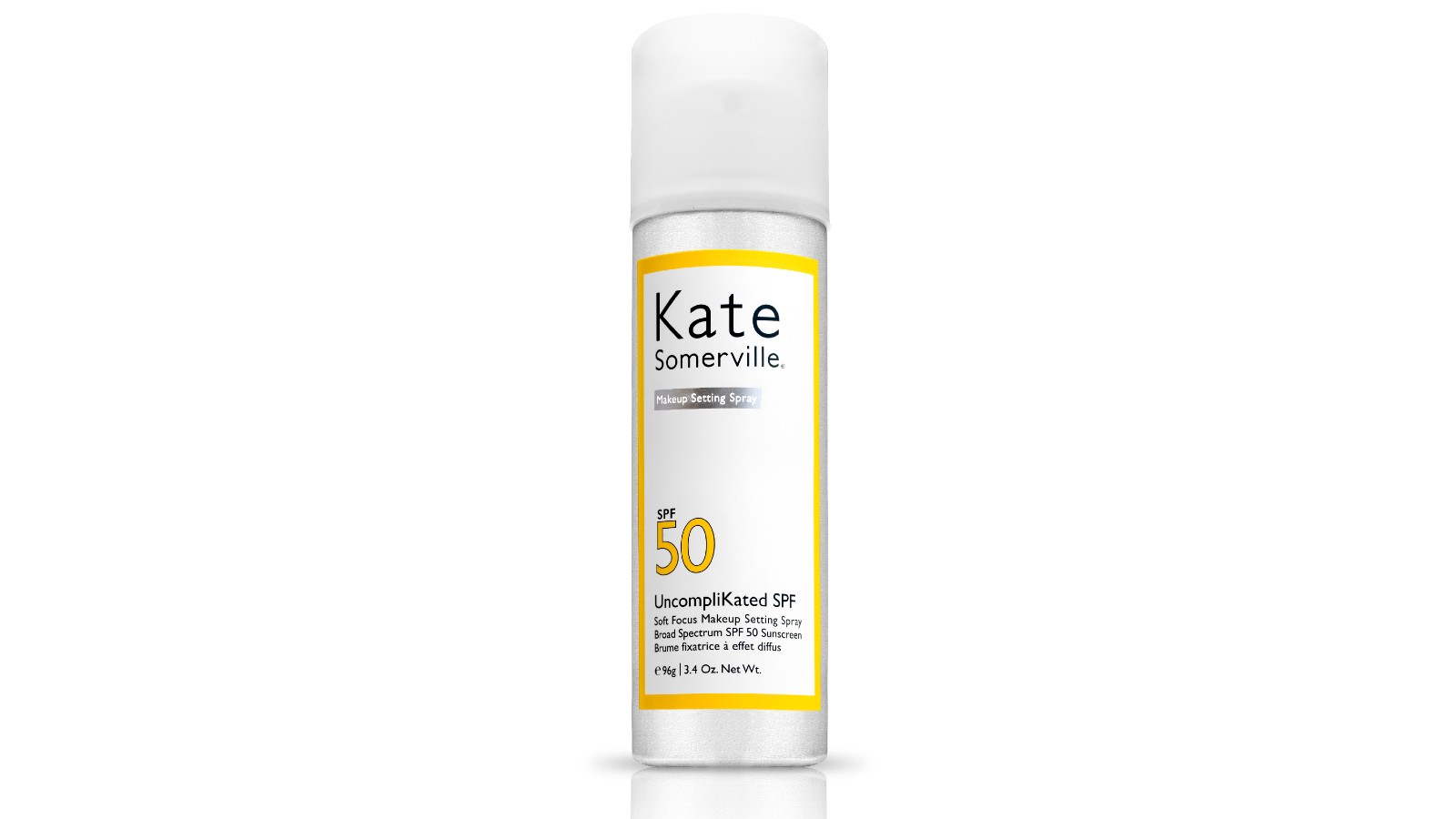
11. Kate Somerville UncompliKated SPF50 Soft Focus Makeup Setting Spray
Our expert review:
Specifications
Reasons to buy
Reasons to avoid
Can’t face the idea of adding another step to your beauty regime? This two-in-one make-up setting spray and SPF might just be the best facial sunscreen for you. It’s pricey, but we think it's a treat to use, flexing an expensive-feeling mist action that evenly dispenses product across your face and neck. It looks good too, with light-diffusing silicones leaving skin looking like it’s been graced by a soft-focus filter. It is quite mattifying, which works well for oily and combination skin, but may give too flat a finish if your complexion is naturally dry.
Dermatologist verdict: "It's a mineral sunscreen and this makes it a good fit for those with sensitive skin. I also like that it is water resistant for up to 80 minutes," says dermatologist Dr. Anton.
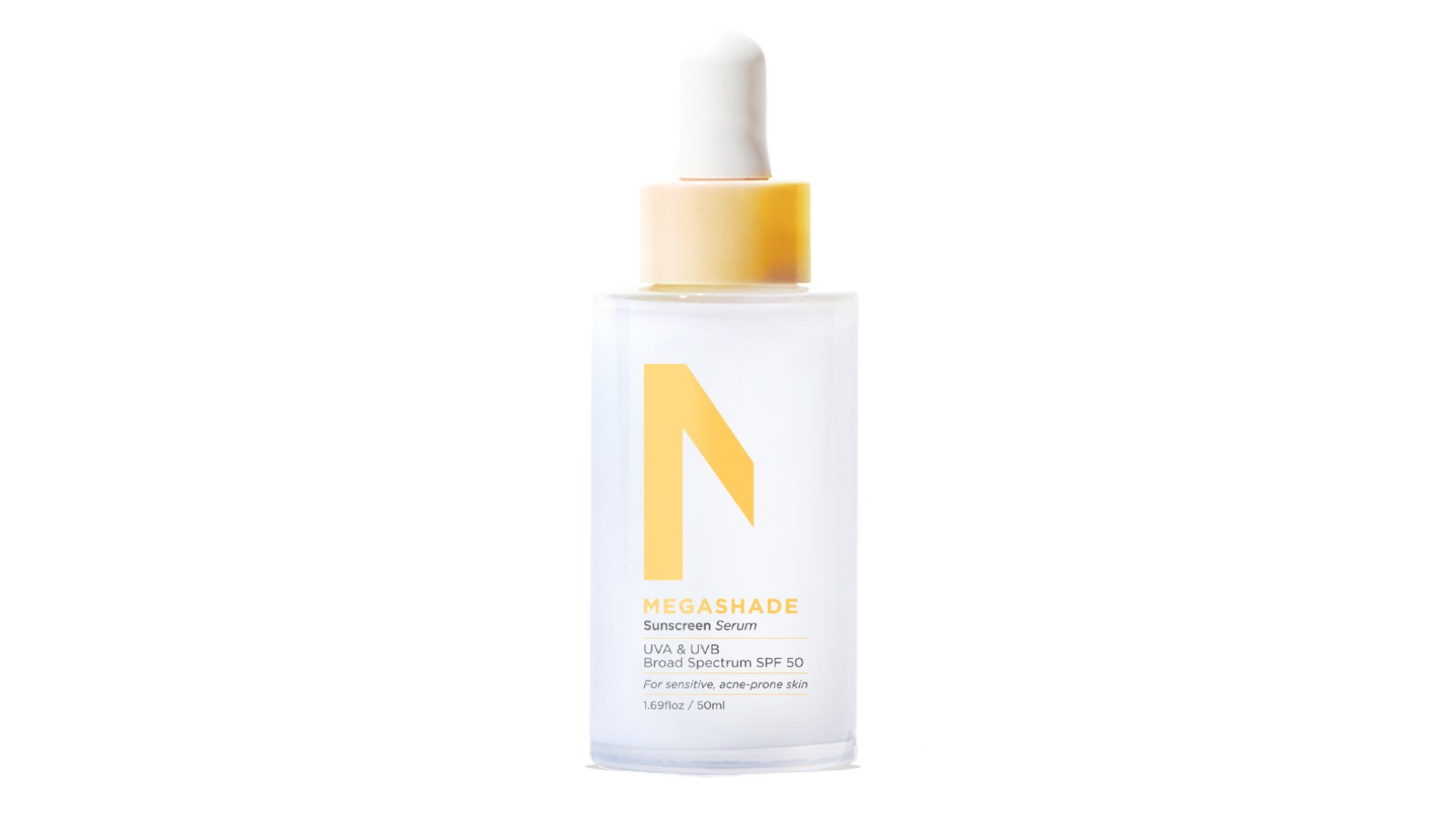
12. ZitSticka Megashade
Our expert review:
Specifications
Reasons to buy
Reasons to avoid
The brand that brought us their game-changing, spot-reducing stickers are at it again, this time formulating a gentle sunscreen especially for those with sensitive or breakout-prone complexions. Going one step further than being simply non-comedogenic (meaning it won’t block your pores) it also contains tea tree oil, a natural anti-inflammatory with anti-bacterial properties. The formula contains a mix of both mineral and chemical filters, creating a physical barrier to UV whilst absorbing additional and turning it into heat instead. Word of warning - it appears shockingly white when it comes out of the pipette, but quickly dials down to a transparent finish as you rub it in. It’s lightweight, and doesn’t make your face feel hot or caked in product. The finish is smooth and silky with a subtle glow. The ideal base for make-up.
Dermatologist verdict: Dr Anton Alexandroff likes this mineral-chemical hybrid for it's added spot fighting powers. "It helps to treat spots, hydrates skin, lightens dark spots and protects against new dark spots." Win win.
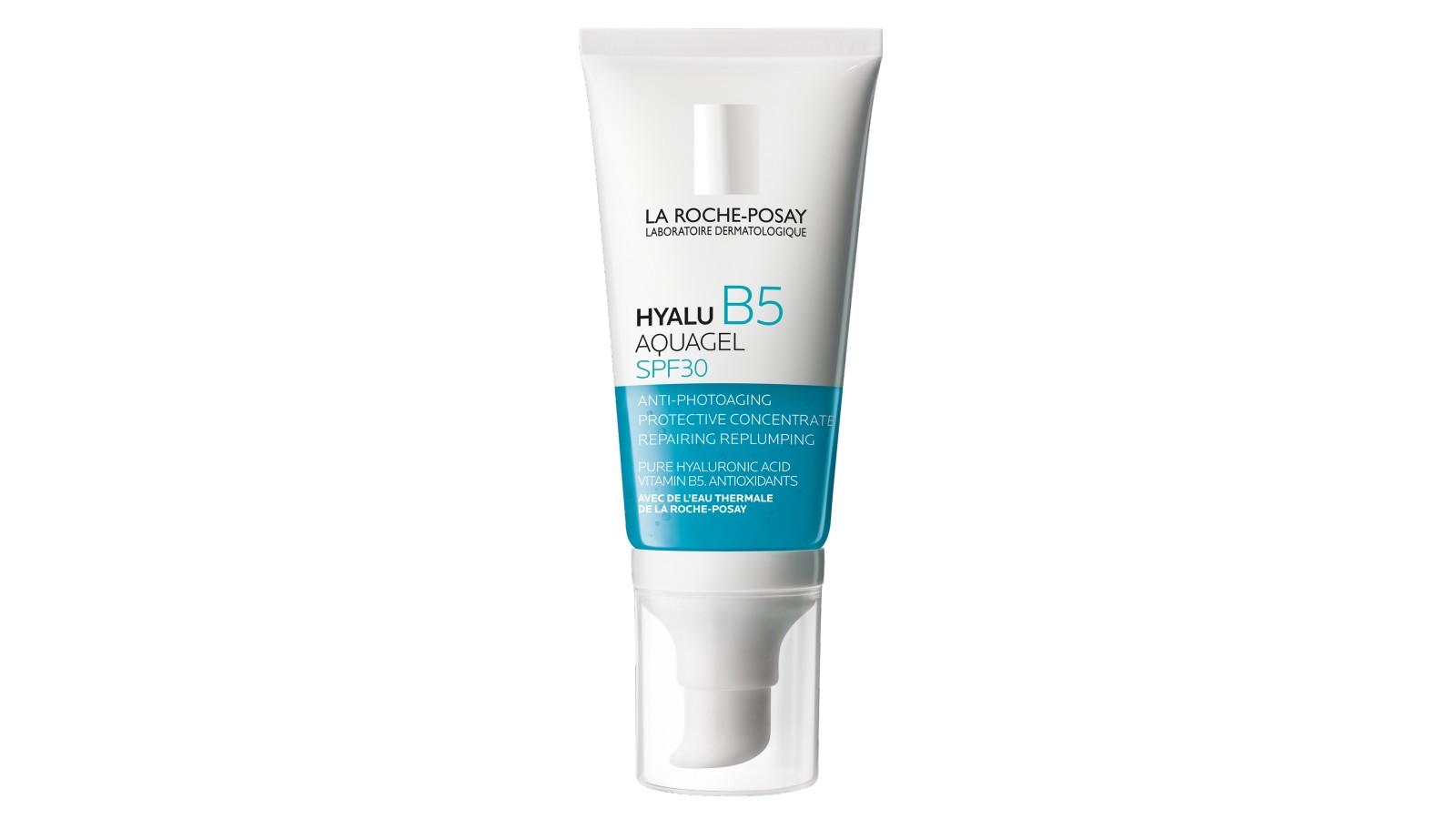
13. La Roche-Posay Hyalu B5 Aquagel SPF30
Our expert review:
Specifications
Reasons to buy
Reasons to avoid
Hyaluronic acid is a hero hydrator that can hold up to 1000 times its own weight in water. It occurs naturally in the skin, but stocks deplete as we age, so doubling down with skincare will only make your complexion feel plumper. This SPF is full of the good stuff, and for that reason left our skin feeling fresh and glowy. A little goes a long way, so apply slowly, you can always add more. Because of the added skincare benefits, there’s no need to layer over a moisturiser or serum unless you think your skin needs it.
Dermatologist verdict: "I recommend any of the sunscreens listed by La Roche Posay," says Dr Abha Gulati, a consultant dermatologist at Stratum Clinics. "They are effective and are developed to suit patients with and without skin sensitivities or problems. For example, the range includes products for acne-prone skin, atopic dermatitis, pigmentation and some contain anti-aging compounds."
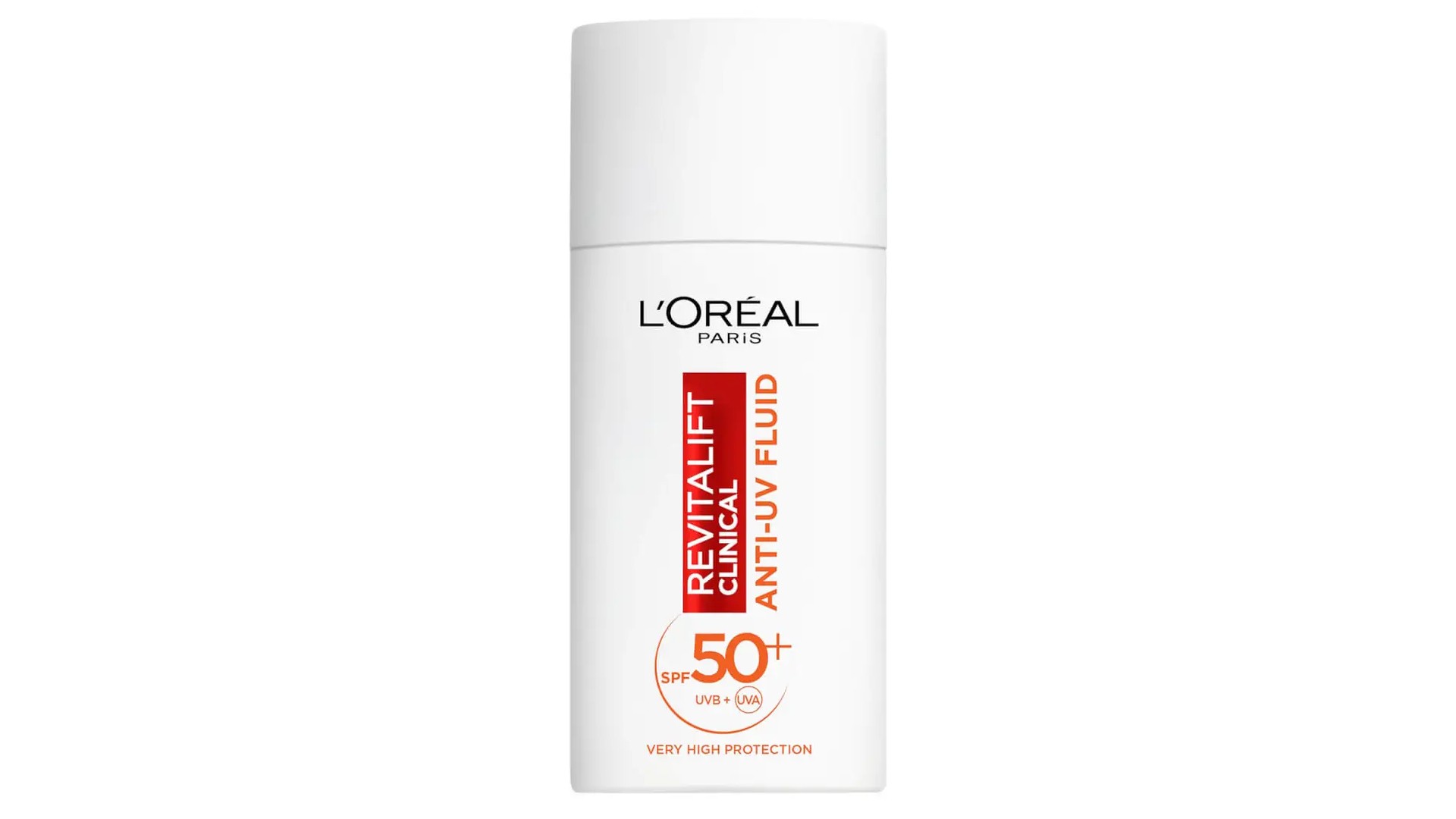
14. L'Oréal Paris Revitalift Clinical Vitamin C UV Fluid SPF 50+ Moisturiser
Our expert review:
Specifications
Reasons to buy
Reasons to avoid
We love it when products can multitask by having a couple of benefits in one, and this is the best sunscreen for your face that certainly delivers across multiple fields. The secret is the addition of hardworking Vitamin C, which will help brighten any pigmentation or dullness, and also protect skin from damage caused by pollution. As for the formula itself, it's an incredibly lightweight texture that sinks in quickly and leaves no white cast.
Dermatologist verdict: Harley Street consultant dermatologist Dr Ophelia Veraitch, rates this formula. "This contains hyaluronic acid and glycerin which are great for maintaining the skin barrier," she says. "It also contains vitamin C which is an excellent antioxidant, and particularly good to prevent and treat hyperpigmentation. I like that it has a very thin formulation, so it's not so congesting for breakout or acne prone skin."
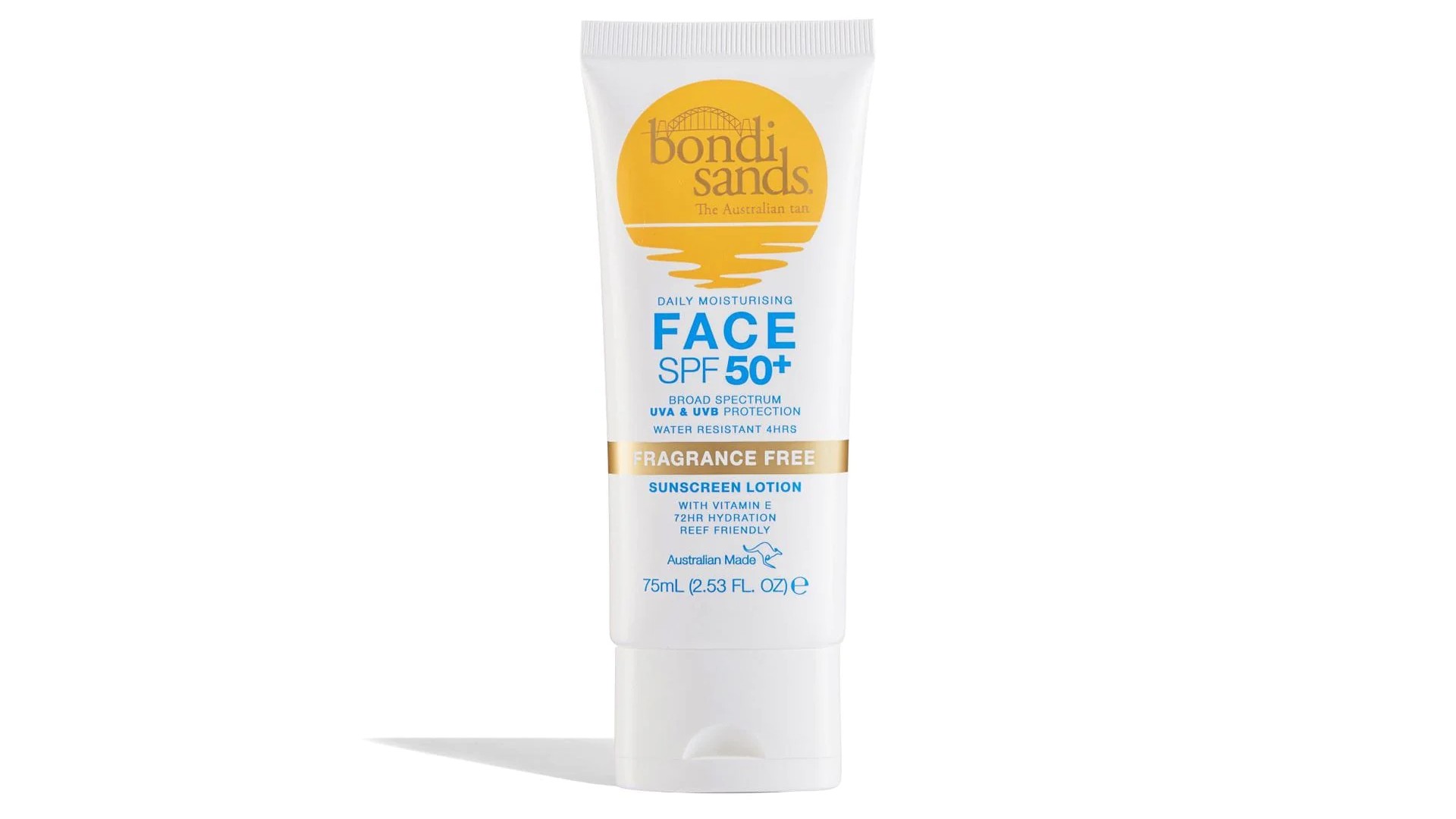
15. Bondi Sands Sunscreen Lotion SPF 50+ for Face
Our expert review:
Specifications
Reasons to buy
Reasons to avoid
You don't have to spend a lot of money to get the best sunscreen for your face, and this buy proves it. The beauty team are big fans of this light, comfortable formula that feels more like a moisturiser than a sunscreen. It also has the benefit of being fragrance-free and waterproof, meaning it's suitable for sensitive skin and will last through hot summer days.
Dermatologist verdict: Dr. Veraitch's verdict is, "It is water resistant so good for summer holidays. For water-resistant SPF I advise applying it in the hotel room before going outside to the pool, as this allows time for the SPF to dry onto the skin. I like that this formulation is fragrance-free too. I will however note that it contains octocrylene which isn't reef safe, so I wouldn't advise wearing it when in the sea."
How we tested the best sunscreen for your face
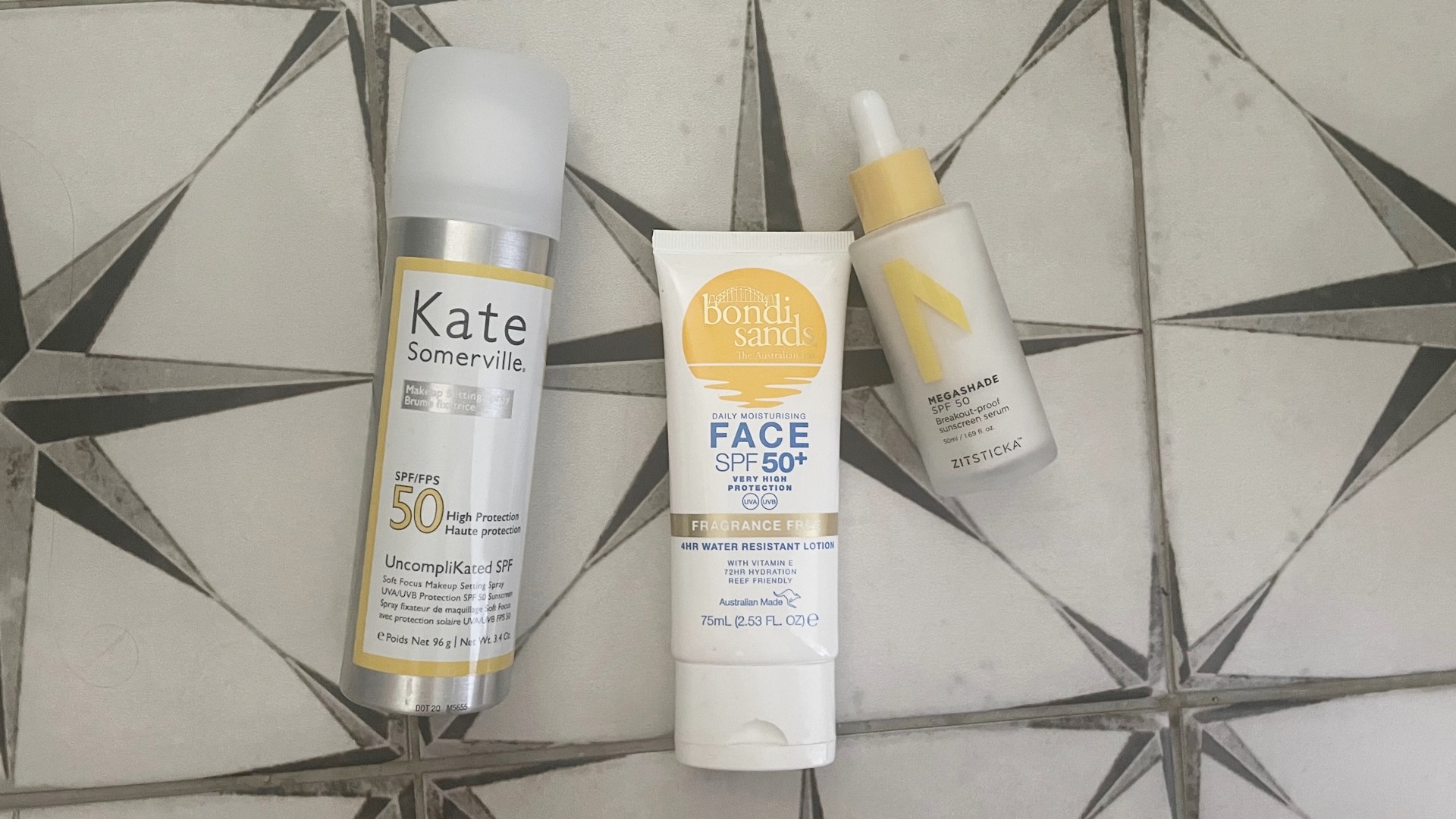
Three of Senior Beauty Editor Rhiannon Derbyshire's favourite facial sunscreens.
For the purpose of finding the best sunscreen for your face, we did a lot of testing. We wanted to try options at all price points, so tried products from budget brands all the way through to the high-end, luxury picks. We tested each buy for a minimum of two days to give them a really rigorous testing, and to fully test out how they each felt on skin.
We've looked at the ingredient list, checked the prices and SPF levels, then considered our thoughts on the application and how well it absorbs. This is in addition to considering other skin factors too, like products being non-comedogenic (won't block pores), anti-aging, and moisture-adding.
For our final test step, we consulted the experts - a team of trusted dermatologists - who looked at all the science and signed off on the products' pros and cons. The list you see is a rigorously compiled list that takes all of these into account, ranked in star order.
How to choose the best sunscreen for your face
The best sunscreen for your face is dependent on your skin tones, as people with different colourings have differing needs and requirements. “The Fitzpatrick scale classifies skin colour and its ability to tan into six skin types ranging from type 1 skin (fair skinned, blonde/red headed) to type 6 skin (black African/Caribbean skin),” says Dr Adam Fridmann, Consultant Dermatologist at The Harley Street Dermatology Clinic.
“Those at the lower end with paler skin will only ever burn, or tan minimally, however, those people with darker skin at the mid or higher end of the scale have a natural ability to produce melanin to protect the skin and tan easily. SPF 15 is fine for those with olive or darker skin types and SPF 30 for most white, Caucasian skin. Very fair pale skin could benefit from increasing the SPF to 50."
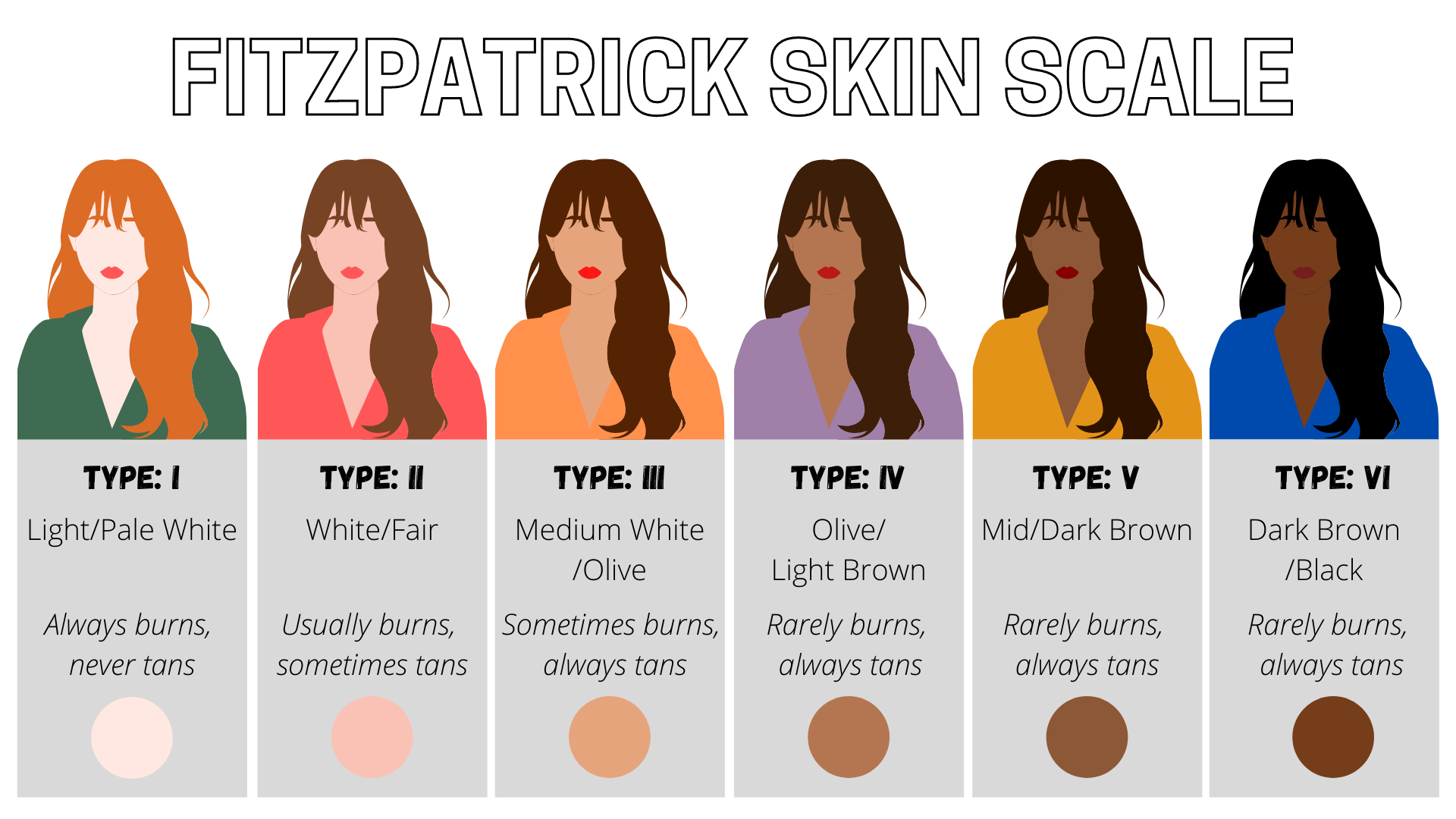
Unfortunately, not all sunscreen manufacturers have cottoned on to the importance of suitable shades for all skin tones. For that reason, if you’re at the higher end of the Fitzpatrick scale, you may find that some sunscreens for face leave you with a white cast. Formulas that are lightweight, or describe themselves as “invisible” or “suitable for all skin tones” are the best options here.
Mineral v Chemical - what's the difference?
- Mineral (also known as physical) - these REFLECT UV rays. You'll know if a sunscreen is mineral as it will contains the ingredients titanium dioxide and zinc oxide. These are better suited to sensitive and acne-prone skin, though they can leave a white cast.
- Chemical - these ABSORB UV rays, convert them into heat and flushes this from the body. These tend to be lighter and rub in easier. Some chemical sun screens contain the ingredient oxybenzone and whilst safe for humans this can have a devastating effect on marine life and coral.
Ultimately, it’s down to personal preference. Don’t be afraid to play around with different formulas until you find the right one.
Dermatologist Dr Abha Gulati gives us her verdict: "I have tried both chemical and mineral suncreams on myself and my kids. I find the chemical ones easier to blend into the skin," she tells us. "However, I have to be quite careful as they often flare my hayfever causing burning and stinging of my eyes and itchy skin on my kids who have eczema.
"The mineral based ones are less irritating but most current formulations don’t blend in well and can have a pastey feeling. I am looking forward to the new formulations in development which are expected to be easier to use and less irritating for sensitive skin.”
When to apply your face sunscreen?
The general consensus from the experts is to apply 20 minutes before heading out into the sun. You should then remember to re-apply, especially if it's an extra-hot day or you're engaging in physical exercise.
"The best time to apply sunscreen is 30 minutes before sun exposure, to allow it to get absorbed into the skin," dermatologist Dr Anton Alexandroff tells us. "Sunscreen should be reapplied every 2-3 hours, and after swimming or any physical activity that makes you sweat - like jogging or playing volleyball."
One 2018 study by the University of Copenhagen goes one step further and advises a "double application of sunscreen before sun exposure". Their reasoning? It reduces the risk of any skin having missed sunscreen and ensures a generous quantity to fight the rays.
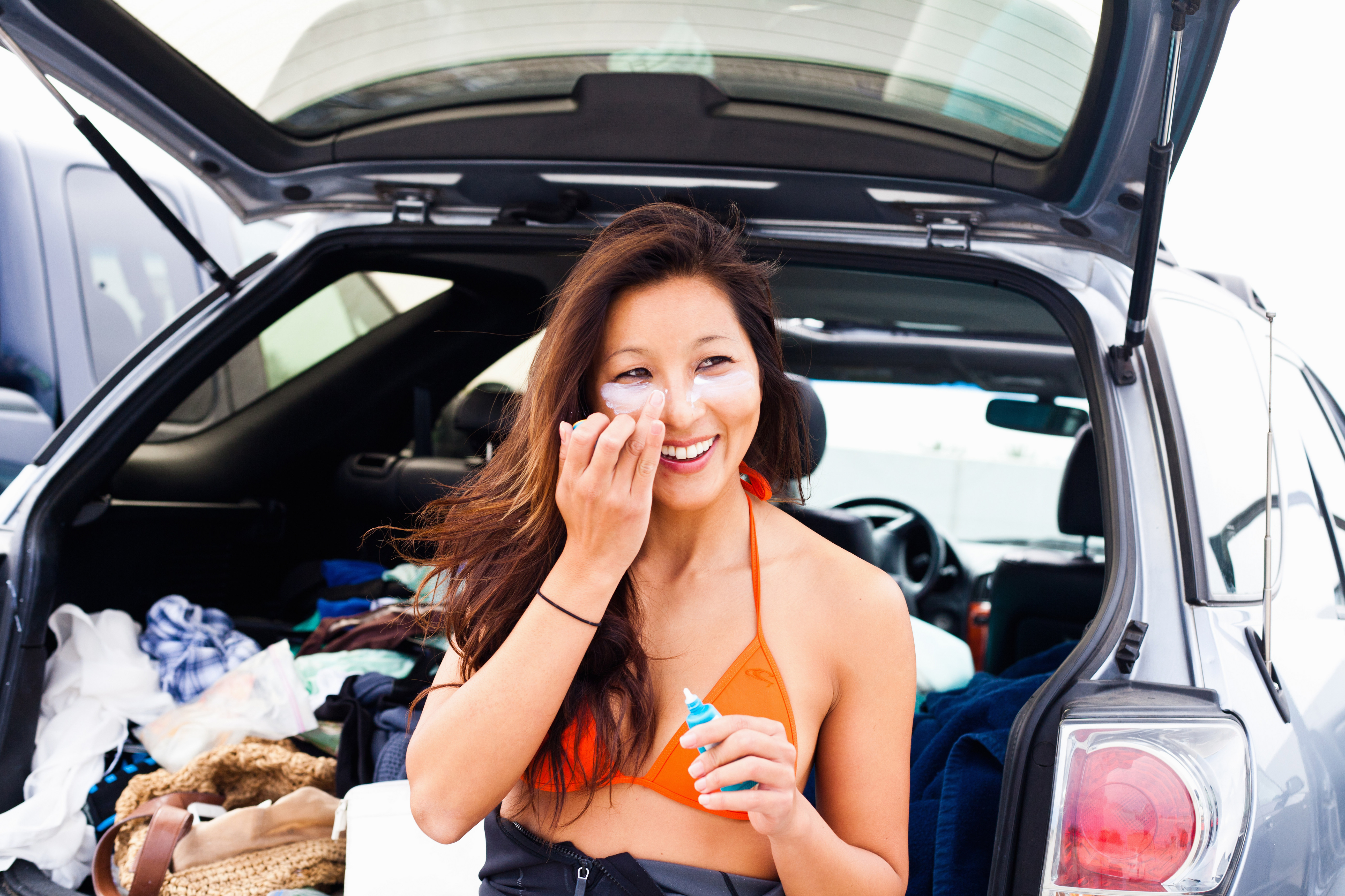
Is SPF30 or SPF50 better for your face?
An SPF 30 will protect you from 97 per cent of UVB rays. That number rises to 98 percent protection with SPF 50, according to dermatologist Dr Dennis Gross. If you find SPF50’s too heavy, you may be less likely to apply liberally and regularly. In which case, the loss of 1 percent protection by switching to an SPF30 is outweighed by the level of coverage your skin is getting.
SPF stands for sun protection factor, and the number indicates how many minutes you can spend in the sun before burning from UVB rays. UVB rays vary in intensity depending on the weather, and you’re most at risk during spring and summer, when the sun is highest in the sky. What SPF doesn’t take into account is UVA. These pesky rays are present all year round, and can penetrate through clouds and glass. While over-exposure to them won’t necessarily leave you burnt and sore, they do travel deeper into the skin’s layers and speed up the ageing process.For this reason, it’s really important to select a broad spectrum sunscreen for the face that protects against both UVB and UVA rays.
Good application is also vital for adequate protection. “It’s important to bear in mind that we need to apply over half a teaspoon of SPF sunscreen to the face, neck and backs of ears,” says Dr Adam Freidmann, Consultant dermatologist for Stratum Dermatology Clinics. “Applying less will reduce the protection to a higher degree than is proportionate – for example, only applying half the required amount can actually reduce the protection by as much as two thirds.” Pay special attention to easy-to-miss spots like the top of your ears and temples.
Is the SPF in my moisturiser enough?
The short answer is no. Some foundations and moisturisers may claim to offer SPF, but unfortunately they don’t offer the same high level of protection as 'pure' SPF.
“SPF moisturisers are useful for short bursts of sun exposure but not suitable for longer stints outside as they may not give sufficient protection,” explains Dr Adam Fridmann. “This is because they are applied first thing in the morning, rather than being reapplied every two hours as recommended for an SPF. They are also often applied in a much thinner layer, meaning that the SPF level may not be what is promoted on the bottle.”
Should you wear sunscreen on your face everyday?
Yes, you should wear facial sun cream every day. Experts stress that sunscreen for the face is an all-year-round requirement, not just for the summer months.
Due to our latitude in the UK, we get very very little UVB between October and March – this is the sun’s ray often associated with burning. In the spring and summer, however, it is worthwhile switching to a separate sunscreen to be used after your regular moisturiser.
However, this isn’t a case of one size fits all and some common sense also needs to be employed. Dr Anjali Mahto told us, "If you are regularly using exfoliating products during the winter such as AHAs and BHAs, you are better off with a separate regular sunscreen. Similarly, if you participate in outdoor sports or work and are likely to be outside for longer than twenty minutes or so at a time you should wear daily sun protection. The same applies if you live in a sunny climate or close to the equator; wearing a regular daily sunscreen throughout the year is strongly advised.”
Can you wear normal suncream on your face?
You can, but it may not be as comfortable to wear. Consultant Dermatologist Dr. Justine Hextall explains, "You can use body SPF on your face, absolutely. The only caveat is that the face tends to be more sensitive and more prone to irritation and allergy."
She continues, "Facial sun creams are usually created to be as effective yet gentle as possible, often designed to protect against eye stinging. These features may not be present in a body sun cream. A body sun cream would be more likely to contain perfumes to enhance its use. If you want to use a body sun cream choose one created for the most sensitive skin."
We spoke to the following skincare experts:

Dr. Ophelia Veraitch attracts clients to her Harley Street Practice from across the globe including well-known celebrities and several Royal families for the professional treatment of skin and hair conditions as well as aesthetic concerns.

Dr Anton Alexandroff is a Consultant Dermatologist at Harley St offices, Cambridge Nuffield Health hospital, Cambridge Spire Lea hospital, Leicester Nuffield Health hospital and Bedford BMI Manor hospital.

Dr Emma Wedgeworth is a Consultant Dermatologist with a passion for healthy skin. She works privately from her practice on Harley street in Central London, and has a particular interest in acne, eczema, sun damage and rosacea. She treats patients of all ages, seeing both adults and children. Over the past decade, she has published a number of scientific articles, and has been involved in clinical trials and cutting-edge dermatological research.

Dr Suchitra Chinthapalli is a Consultant Dermatologist specialising in all areas of General Dermatology and has particular expertise in Skin Cancer, Skin Surgery including mole removals, Acne and Eczema.

Dr Suchitra Chinthapalli is a Consultant Dermatologist specialising in all areas of General Dermatology and has particular expertise in Skin Cancer, Skin Surgery including mole removals, Acne and Eczema.

Dr. Gitta Neufang began her career at Beiersdorf AG in 2003 as a researcher for sensitive skin. In 2014, she joined the Derma department and became the Global Director of Medical Management, and in 2019 she took over as Chief Medical & Innovation Officer Pharmacy Brands

Dr Friedmann, consultant dermatologist and clinical lead at The Harley Street Dermatology Clinic, is a UK-trained Dermatologist and graduate of King's College School of Medicine, London. His areas of interest include acne, eczema, psoriasis, blistering conditions and skin cancer. He has over 20 years of experience in Dermatology.

Dr Abha Gulati is a UK-trained consultant dermatologist here at 108 Harley Street. She has over 15 years’ experience in all aspects of general dermatology in adults and children and consults on all aspects of skin disease including skin cancer, moles, acne, eczema, psoriasis and inflammatory skin diseases.

Dr Justine Hextall is a Fellow of the Royal College of Physicians and has been an NHS Consultant dermatologist for more than a decade. As a dermatological surgeon and skin cancer expert Dr Hextall specialises in the surgical and non-surgical management of facial skin cancers. She has a specific expertise in the use of dermoscopy in the diagnosis of skin cancer and lectures widely on this subject

Abi Cleeve is a Beauty expert and founder of skincare brand SkinSense.
Parenting advice, hot topics, best buys and family finance tips delivered straight to your inbox.
- Rhiannon DerbyshireSenior Beauty Editor